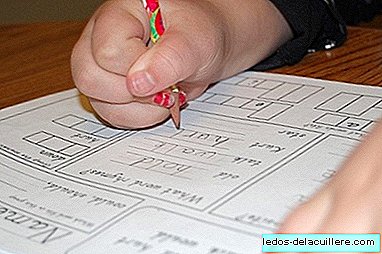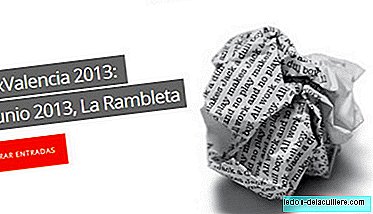
When in society there is a need for children to start learning as soon as possible subjects such as English from daycare or from 3 years old, or parents expect that at 4 years old they start reading, we receive information about studies and scholars who recommend that children have no homework.
Yes, you read correctly, children should not have homework. Or at least not the kind of duties we know. I think, in fact, we should never have had them.
No one has yet shown that they have any use or that it helps children to learn more.
I still remember my childhood full of exercises and work. At the beginning of the course I sat patiently as soon as I arrived from class and I did them with good writing and dedication. Gradually they became an odious obligation that ended up doing at the last minute, wrong, and as a measure to avoid punishment (for not doing them).
What could I learn from some exercises I did to "save my ass"?
Or rather, how could I feel like learning anything if I felt compelled and pressured to learn?
For decades there is a belief that more time devoted to a task is a benefit in terms of learning.
It is true that people need time to learn things, however it is not true that increasing learning time necessarily implies learning more. It is not the amount of time that helps them, but the quality of it (sometimes added to the quantity, of course).
What makes a child learn more is the vision he has of himself performing tasks and how to get involved. If from the school teaching methods are used that respect the desire to learn from children and are involved in the search for information making them participants in the learning, it is very likely that their curiosity and desire to learn continue at home and that the time spent with Parents be much more fruitful.
In other words, a child wants to learn when he feels an active part of learning, when he is asked about a subject he knows, when he is heard, when they try to answer his questions, when he can also answer and when he feels that, thanks to him, and thanks to the rest, everyone learns something.
Formerly the classes were delimited in time in a rigid way (one hour per class or similar) and were taught by teachers in a hierarchical way (I know, you don't). The duties were a simple extension of the system (for tomorrow you do 2, 3 and 4 on page 27 and 8 and 9 on 28 ...).
This learning system was based on overturning (not to say vomiting) the subjects in the heads of our little ones, whether they liked it or not, so that they later vomited them in their homework and then, as adults, in the exams.
Learning ended up becoming an obligation and something we should do yes or yes. And you know that there is nothing to force someone to do something to lose interest.

I don't know about you, but in my school age they got something as nutritious and stimulating as reading to be an almost hateful element for me. They forced us to read and then summarize, transforming the pleasure of reading into another job to evaluate.
If instead of this model we apply a more respectful one (many schools are already doing so approaching the Finnish model) the result is different.
The ideal is that the children express their innate curiosity and that it be exploited. Choosing the topics to be discussed among all students means that they end up learning what they like and that they feel they are an active part of the school (and not an empty container of knowledge waiting to be filled).
If instead of “see that I explain it to you” we say “come on, we look for it”, we allow the child to learn together with us adults and probably the adult to learn from what a child can already know (or do children not have previous knowledge about some subjects?).
Flexible schedules help children not to have to cease their activities at the time they are more focused on what they do and allows them to change activity when they are very tired of some activity (even if they do not touch by schedule).
If this active education system is given, telling a child to continue expanding their knowledge at home, bringing something that can help the rest of the class, transforms an obligation into a learning challenge for themselves and their classmates.
Traditional duties are based on the theory of reinforcement, which says that for something to be recorded it needs to be practiced the longer the better. This can be useful for actions that require automatisms, such as sports, but the result in learning is that some students help them remember the answers more easily, but none learn to become a better thinker.
That is, it teaches them to memorize (and eventually forget) and to automate processes, but it does not teach them to understand or get used to thinking. They are duties that seek learning from repetition and “copy-paste” and in this way there is no growth in the capabilities of search and selection of information or in decision-making.
On the other hand the supposed benefit is not such for all children. Some will have already understood the subject in class and will do it without need and others will do it without even understanding what they are doing.
Any educational strategy that ends up being an obligation or that children see as something they have to finish soon is destined to fail ... Do not you think?












